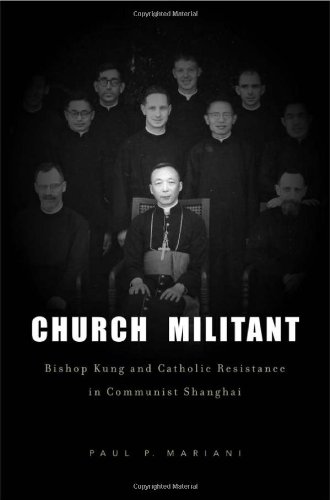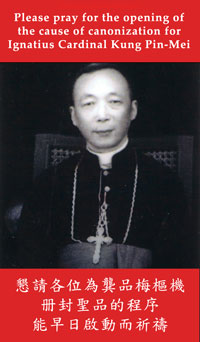Church Militant: Bishop Kung and Catholic Resistance in Communist Shanghai
by Paul P. Mariani
October 24, 2011
![]()
 |
Book Description By 1952 the Chinese Communist Party had suppressed all organized resistance to its regime and stood unopposed, or so it has been believed. Internal party documents—declassified just long enough for historian Paul Mariani to send copies out of China—disclose that one group deemed an enemy of the state held out after the others had fallen. A party report from Shanghai marked "top-secret" reveals a determined, often courageous resistance by the local Catholic Church. Drawing on centuries of experience in struggling with the Chinese authorities, the Church was proving a stubborn match for the party. Mariani tells the story of how Bishop (later Cardinal) Ignatius Kung Pinmei, the Jesuits, and the Catholic Youth resisted the regime's punishing assault on the Shanghai Catholic community and refused to renounce the pope and the Church in Rome. Acting clandestinely, mirroring tactics used by the previously underground CCP, Shanghai's Catholics persevered until 1955, when the party arrested Kung and 1,200 other leading Catholics. The imprisoned believers were later shocked to learn that the betrayal had come from within their own ranks. Though the CCP could not eradicate the Catholic Church in China, it succeeded in dividing it. Mariani's secret history traces the origins of a deep split in the Chinese Catholic community, where relations between the "Patriotic" and underground churches remain strained even today. Editorial Reviews An original and insightful study of the conflicts between the Catholic Church and Communist state in Shanghai during the Maoist period. Mariani challenges the widespread conception that the Communist state was able to consolidate its rule with little resistance in the 1950s, sheds light on some intriguing aspects of the Catholic Church under Communist rule, and reconceptualizes the overall Catholic experience in Shanghai. Full of insightful details, often emotionally moving, this is an outstanding contribution. --Joseph Tse-hei Lee, Pace University, New York A gripping narrative of how militant Catholics in Shanghai in the 1950s tried to resist the Communist Party and how the Party crushed them. The book contains interesting material, based on internal party documents, on the tactics used by the Communists to organize multifaceted campaigns against the church, to infiltrate Catholic organizations, and to divide Catholics from one another. Mariani also examines the effects of this legacy of persecution on the Catholic community in Shanghai today. --Richard Madsen, University of California, San Diego Mariani does more than just recount the manner in which Catholic communities in Shanghai sought to deal with the increasingly harsh pressures brought to bear upon them during the first years of the People's Republic of China. He also illuminates how the Chinese government is able to control the activities of citizens like Nobel Prize-winner Liu Xiaobo and artist Ai Weiwei. While the context has changed, this case study is revelatory for all who wish to understand the behind-the-scenes mechanisms in China today. --Jeremy Clarke, S.J., Boston College Solidly based on archival research, Mariani's brisk and compelling narrative has many of the qualities of a suspense novel. This is a book of firsts: the first time this story has been told, the first detailed local history of the Church in China, and the first scholarly blow-by-blow account of the Church's struggle with the Communist Chinese government. A must-read for anyone interested in post-1949 history or religion in China. --Guy S. Alitto, University of Chicago To buy a copy, click here |



